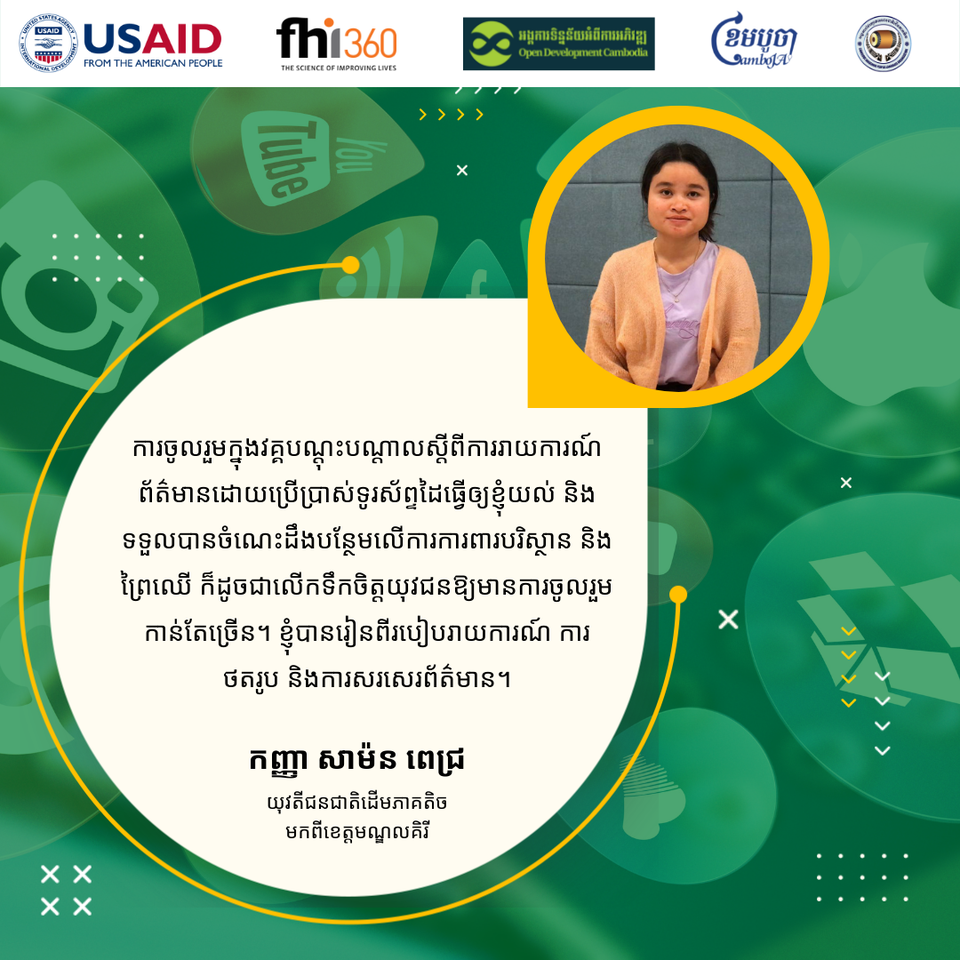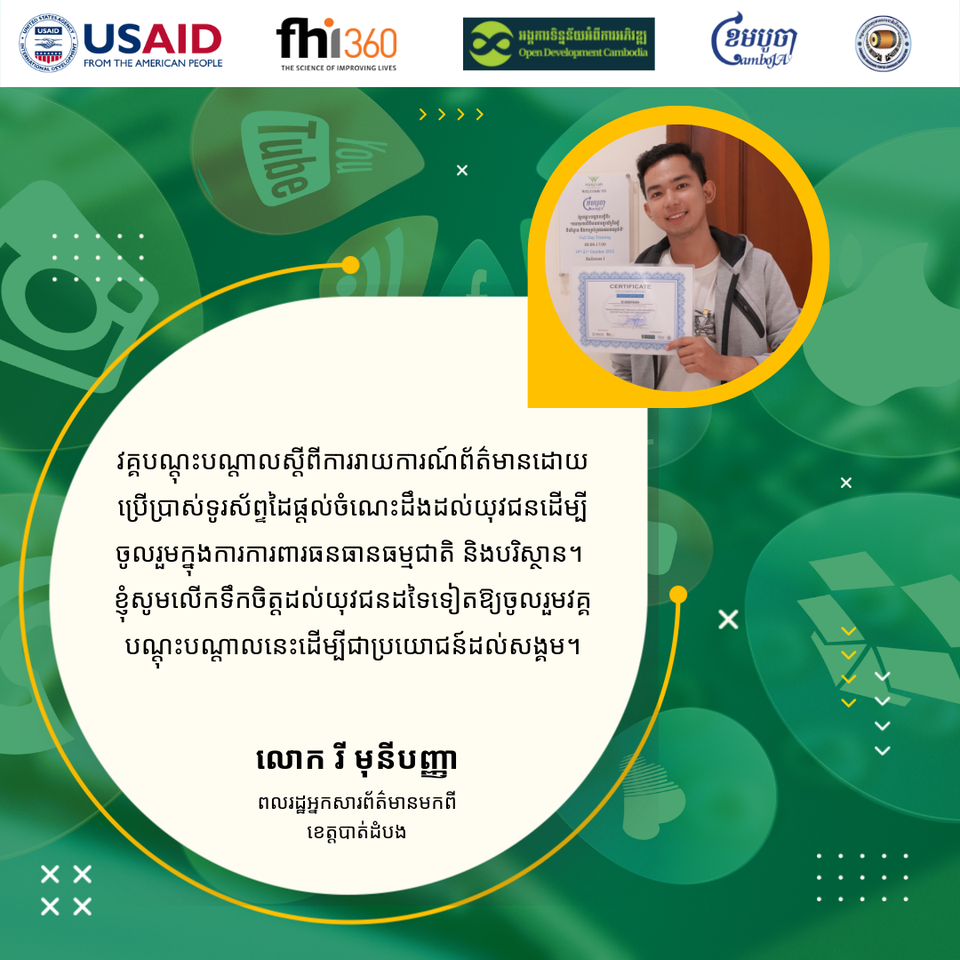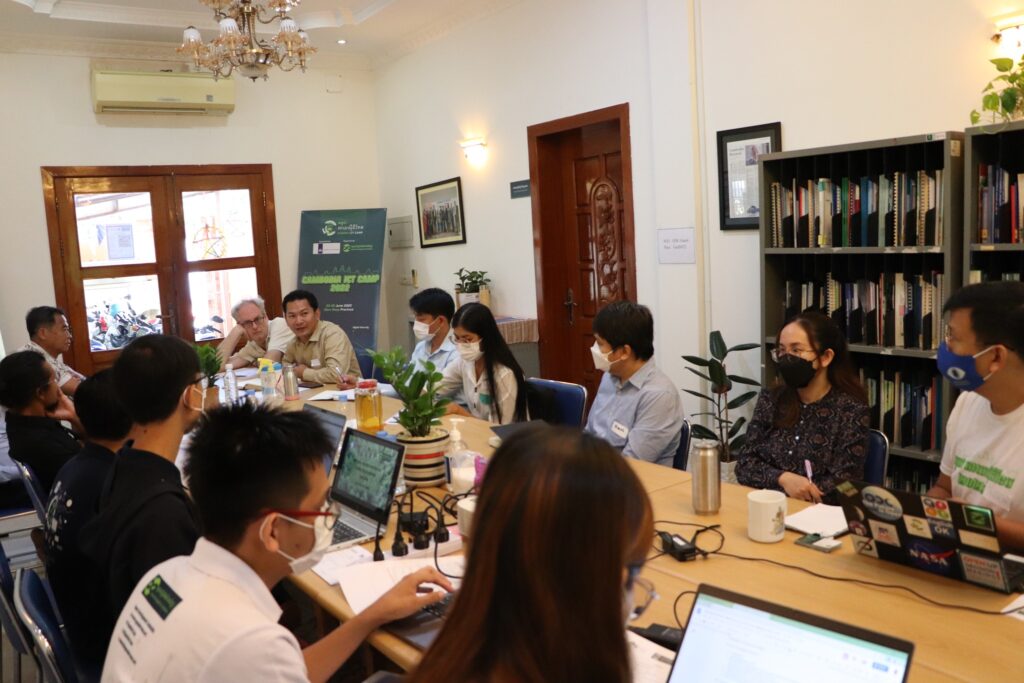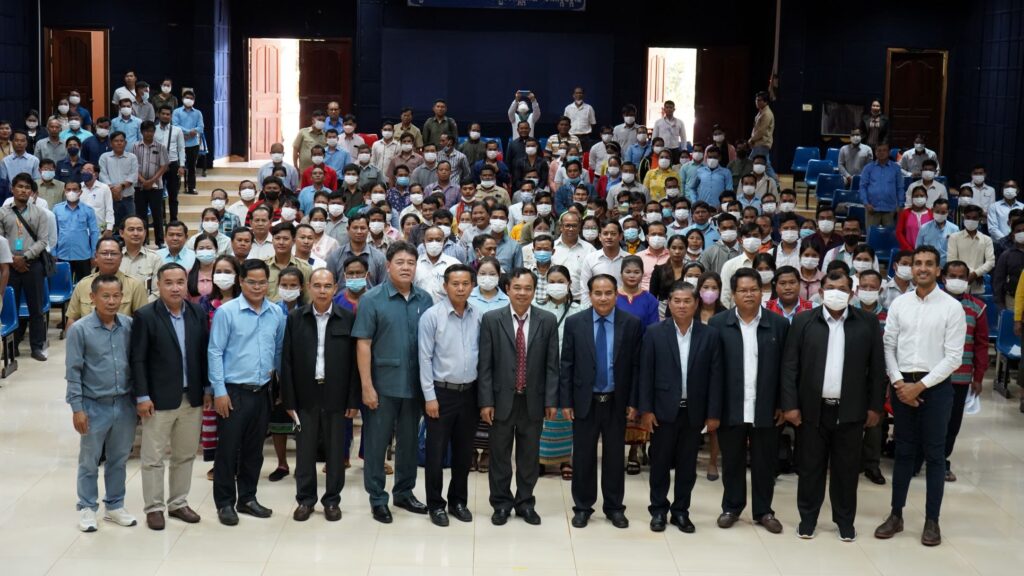- Learning Platform
- Blog
- Testimonial: Young indigenous woman and citizen journalist think about the mobile report training
Would you like to know what our young indigenous woman and citizen journalist think about the mobile report training? Let’s have a look at their testimonials together!
This activity is under the Civil Society Support Activity: Cluster Anchor Grants, founded by USAID Cambodia through FHI 360.


Other Stories
Sectoral advisory meeting on forest cover mapping
On 29 August 2022, Open Development Cambodia hosted a sectoral advisory meeting on forest cover mapping with national and international experts, NGOs, as well as academia. This meeting is focused on the use of remote sensing in forest cover and land cover mapping. ODC has received a lot of input and comments regarding the literature review, techniques, needs, as well as action plan. The project is funded by USAID Cambodia through FHI 360 under Cluster Anchor Grant from the Civil Society Support (CSS) Project.
- Forest and forestryLand and natural resources
- 30 Aug 2022
- 89
Indigenous peoples sectoral advisory meeting
On 08 February 2023, ODC organized the “Indigenous Peoples Sectoral Advisory Meeting” with the partners, including Conserve Indigenous Peoples Languages Organization, MyVillage Cambodia - MVi អង្គការ ភូមិខ្ញុំ, Forests and Livelihood Organization FLO, Cambodia Indigenous Youth Association-CIYA, and FHI 360 to identify the challenges, activities, roles of the group, and call for new members. The project is funded by USAID Cambodia through FHI 360 under Cluster Anchor Grant from the Civil Society Support (CSS) Project.
Land and natural resource governance
Open Development Cambodia (ODC) under the Civil Society Support Activity: Cluster Anchor Grants funded by United States Agency for International Development (USAID) through Family Health International (FHI 360) supported indigenous peoples to participate in the Conference on Land and Natural Resource Governance which was organized by the NGO Forum on Cambodia in Ratanakiri province on 12th - 13th October 2022. The conference aims to engage with the Royal Government of Cambodia to advance laws and policies related to land and natural resources and to strengthen the implementation of policies, laws, and regulations that are meant to promote land and natural resource governance with a focus on addressing social impacts and protecting natural resources and the environment, as well as the sustainable livelihoods of local communities. The event was divided into two phases, which began with gathering input from over a hundred local communities, indigenous communities, community protected areas, forestry communities, and local non-governmental organizations (NGOs). The inputs were used for the panel discussion with the representatives of Ratanakiri, Stung Treng, Kratie, Preah Vihear, Mondulkiri, and Kampong Thom Provincial Governors, Ministry of Interior (MoI), Provincial Departments of Agriculture, Forestry and Fisheries, Provincial Departments of Environment, Provincial Department of Land Management, Urban Planning, and Construction, Provincial Departments of Rural Development, Provincial Departments of Mines and Energy, and private sectors on the second day with a total of 250 people (60 females) participated. Land and natural resource governor in Ratanakiri province Economic land concession within the province is granted to 27 companies, of which 10 companies justified the contract, 06 companies are in the process of revising, and 11 companies have not signed the contracts. The business area is 83,785 hectares, with a total investment area of 181,896 hectares. The area that has been cleared is 56,702 hectares, and the cultivated area is 51,067 hectares. There are 75 indigenous communities recognized by the Ministry of Rural Development, while 85 communities have been recognized as legal entities by the Ministry of Interior. However, only 24 indigenous communities received communal land titles from the Ministry of Land Management, Urban Planning, and Construction. Systematic land registration achieved 15,691 titles which is equivalent to 10,741 families. Two villages have finished the public announcement, while a village is in progress. Two public announcements on the communal land titling are finished and requesting reclassification for three communities. There are 11 community-protected areas and 36 community forestry, of which 22 have been registered with the Ministry of Agriculture, Forestry and Fishery (MAFF). There are 14 community fisheries, and all of them have been recognized while two new communities have been established. Recognize and protect customary land tenure The community and civil society organizations have identified key challenges to recognizing and protecting customary land tenure. Land that has received the land title or is in processing is not yet secured, and the process is complicated, time-consuming, and costly. The approved land classification does not correspond to actual practice and occasionally overlaps with protected areas because management areas have not been clearly divided. Despite the fact that the land has been registered, indigenous peoples continue to face land grabbing and deforestation. According to the community, the forest crime crackdown is still limited and ineffective. The community committee\'s capacity and knowledge are limited and need to be expanded in terms of by-laws and internal rules, while the community\'s livelihood and natural resource conservation must be improved. To address the issues, the communities would like to see strong collaboration between communities and local authorities to strengthen law enforcement with the assistance of district and provincial administrations. The network of community forestry should be established from the national to the commune level. The process of titling communal land should be improved, and the government should provide an annual budget for each community to manage the land and forest while also improving their standard of living. The budget could be used as a community loan for each member. Yet, the results of the suggestions cannot be confirmed.


